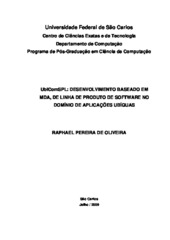UbiComSPL: desenvolvimento baseado em MDA, de linha de produto de software no domínio de aplicações ubíquas
Abstract
This thesis presents an approach to Development based on Model-Driven Architecture, of Ubiquitous Applications Domain Software Product Lines. The approach uses Model-Driven Architecture to facilitate the modeling reuse of the same application in different architectures of the Ubiquitous Computing. With focus in the problem domain, the Software Product Lines core is developed and it is reused in the products construction. One of the assets that composed the Software Product Lines is the Ubiquitous Computing Framework, developed to attend the non functional requirements of Ubiquitous Computing. The CASE tool, called MVCASE, makes automatic part of the activities in the proposed approach.
Collections
Related items
Showing items related by title, author, creator and subject.
-
Catálogo de padrões para o desenvolvimento de software como um serviço multi-tenant
Leite, Bruno Dias (Universidade Federal de São Carlos, UFSCar, Programa de Pós-Graduação em Ciência da Computação - PPGCC, , 20/10/2014)Software as a Service (SaaS) represent a form of software distribution on demand and accessible via the Internet. The development of SaaS enables service users (tenants) to benefit from the low cost of deployment and ... -
Reengenharia de interfaces utilizando Wrapping.
Affonso, Frank José (Universidade Federal de São Carlos, UFSCar, Programa de Pós-Graduação em Ciência da Computação - PPGCC, , 05/09/2003)With the technological evolution and the increasing utilization of the Internet, companies and governmental institutions have been looking for modern solution to replace and improve their legacy systems. These kind of ... -
Recuperação de modelos de classes orientados a aspectos a partir de sistemas orientados a objetos usando refatorações de modelos
Parreira Júnior, Paulo Afonso (Universidade Federal de São Carlos, UFSCar, Programa de Pós-Graduação em Ciência da Computação - PPGCC, , 27/05/2011)Aspect-Oriented Programming allows encapsulating the so-called "Crosscutting Concerns (CCC) - software requirements whose implementation is tangled and scattered throughout the functional modules - into new abstractions, ...
